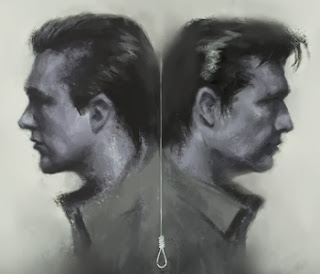I have a sort of attention deficit when it comes to reading, I keep on starting to read new books but when I get bored I'll begin another, which leaves me with a lot of unfinished ones. Anyway, here are a few that I did finish last three months. (Part 1 and Part 2 of these book reactions)
 |
| Mock book cover art of Richard Hickock and Perry Smith by chrispypaints |
For me, the most heart-wrenching books are good and well-written retellings of true-to-life crime. My favorite book of all time which I haven't talked about is No Reason for Murder or Heavenly Blue by Ayako Sono, about a serial killer in Japan in the 1980's and a woman who was his only friend. I mean to write a long review on it, but as usual I can't articulate how much it has affected me. I'll reread it again soon, then maybe I can write about it properly. These stories are always an emotional overhaul, especially if death penalty is the punishment.
One of the books of this kind is In Cold Blood, a retelling of the Clutter family mass murder in a Kansas small-town in 1959. The book itself has started the "true crime" genre. The family murdered, how it affected the community, and the killers themselves are characterized well. It showed that no matter how gruesome the crime, the persons behind it are human, too. That's what makes it so touching, how that murder affected the town people, and also the friends and families of both the victims and the accused.
The Clutters are rich farmers who were normal and admired. Richard Hickock and Perry Smith are both ex-convicts always ready to steal and kill, and the book showed their complex partnership -- they're friends who also scheme against each other. However, it was also sad to read about their trial, imprisonment, and eventual execution. Also contains excellent, factual and research-based explanations of sociopathic behavior and insanity in regards to crime, but it mostly speculates on the scientific and legal debates on the issue.
It is interesting that the author himself witnessed the unfolding of the actual investigations even before the criminals were known, and also got to be close with them himself. The way it was written can make a reader experience it first-hand. This book was a bestseller and made Truman Capote famous. It had its share of criticisms for a book this popular, like he was accused of exploiting the events and criminals for money. Capote claimed the book was factual, which only invited critics to nitpick and point out inconsistencies with actual events. But for me a blow-by-blow retelling is impossible, and as they say, "Any story told twice is fiction." There may be factual errors, but the emotions felt and consequences learned are real.
Lord Foul's Bane by Stephen R. Donaldson
The first of a very popular ten-book fantasy series, The Chronicles of Thomas Covenant the Unbeliever. Like stumbling into Wonderland, Narnia, or Oz, the leper Thomas suddenly woke up in a world called The Land after a car collision. Lord Foul, the entity who is the antagonist, assigns him a mission to bring a message to the Land's lords that he has come to destroy their world. The main character isn't what one can call likable at all. His leprosy and state of mind caused by his disease has made him cynical and hateful -- left by his family and scorned by the world. His personality and thoughts contrast sharply with the grandeur of the Land. Of course, at first he doubts all the magic in the place and suspects it's all a dream. Of course you would think it is a dream or you're going crazy, when they say that you're their destined 'savior' and a reincarnation of a war hero from a bygone age.
Most reviews I read hate the book -- too much corny fantasy tropes and an unlikable main character. But, Covenant's hate is depicted well, enough for me to want to read the rest of the books to see how his story will go.
 Paisley Girl by Fran Gordon
Paisley Girl by Fran GordonThe story is told by an unnamed narrator who has a strange skin cancer that draws paisley patterns all over her skin. The narrative is alternating between bland details of daily life confined in a hospital, and flashbacks of a more exciting life before the disease. And after, when she travels away from home and got involved in drug trafficking. This is the kind of book to be enjoyed for the language, though nothing much happens except the girl's travels, thoughts, family, etc. But I still underlined a lot of clever turns of phrase and poetic lines. The girl seems to wander and wake up in strange men's beds without explanation, though.
"In crossing boundaries there's always change; it's always irreversible. In crossing boundaries, you -- as you know yourself -- die. I suppose that's why people don't want to go there."

No comments:
Post a Comment